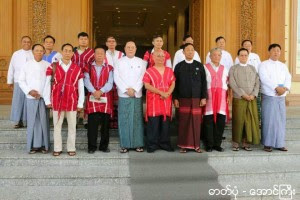Karen community groups have for the first time have called on the Karen National Union to show more transparency and openness in their ongoing peace talks with the Burma government.
 Six Karen civil society groups based in Burma and overseas made their call for the meetings between the KNU and government to be more open so people know and understand the peace process.
Six Karen civil society groups based in Burma and overseas made their call for the meetings between the KNU and government to be more open so people know and understand the peace process.
The six Karen civil society groups are the Karen Women Organization (KWO), Karen Affair Committee (KAC), Karen Youth Network (KYN), Karen Women Empowerment Group (KWEG), Australia Karen Organization (AKO) and the Karen Community of Minnesota (KCM) – the groups worked together to release a statement on June 5th.
Saw Lwin Oo, chairperson of AKO spoke to Karen News about what the six groups are demanding.
“The main objective of our call is for more transparency in the peace building process. There needs to be a more thorough and equal level negotiation on issues with all ethnic groups to achieve a real peace. We have seen more dominance and pushiness on issues by the government in the negotiations instead of compromises [being made] on what the ethnic people want.”
The joint statement put out by the Karen civil society groups was released following a meeting between the KNU’s delegation team lead by its chairperson, Gen. Saw Mutu Sae Po and the Burma government’s President U Thein Sein, the Defense Services Commander-in-Chief, Senior General Min Aung Hlaing, the Parliament Speaker Thura Shwe Mahn and other government members and Tamadaw (Burma Army) officials in Naypyidaw.
The Karen civil society groups’ statement called for more public consultations on the outcomes of each peace meeting in order to keep the Karen people informed about the development of the peace process. The statement called for more participation by civil society groups in the peace talks as they are working in the public interest, The groups also called for a stop to the fighting in Kachin, Shan, and the Ta’ang (Palaung) areas before the signing of a nationwide ceasefire agreement between ethnic armed groups and the government.
Nan Dah Eh Kler, chairperson of the Karen Women Organisation, expressed her concerns over the delay to achieve concrete agreements on the process.
“The implementation process of the peace building is slow. The peace process will only improve when both sides carry out the implementation stages transparently step-by-step. Without transparency, civilians will bear the [negatives] impacts of the peace talks that they would not know about. They would suffer if the impacts were negatives.”
This is the first time Karen civil society groups made such calls since the peace talks between the KNU and government began in January 2012.



